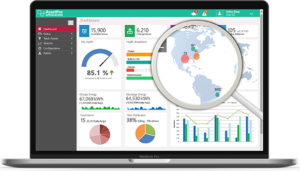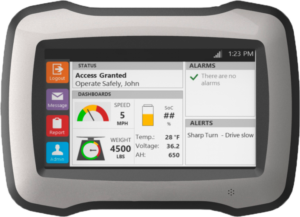Take Fleet Productivity to New Heights with Artificial Intelligence
Manufacturing facilities, distribution centers, and airport ground support all have one major thing in common – they all strive to keep their operations at optimum efficiency to reduce costs and maximize ROI. Fleet managers have a lot on their plate, and in today’s age of technological innovation, businesses that do not adopt automation and integrated fleet management systems are at a major disadvantage. There are several areas of business that must be considered to improve fleet productivity. To be successful, fleet managers should investigate these four key methods to optimize their operations.
1. Utilize a Fleet Management System with an Open API for Fleet Efficiency

To avoid major slowdowns from manual data entry, equipment failures, and employee injuries, it is essential that businesses integrate a fleet management system into their business. Fleet management or telematics systems can increase fleet efficiency significantly by offering benefits like automatic hour meter collection and load sensing, remote monitoring of equipment and personnel, and equipment access control for safety precautions. However, with so many telematics systems on the market, it is difficult to narrow down which is best for your business and is worth the investment for the long haul. Aside from vetting out the key data points to monitor for your business, it is important to invest in a fleet management system with an open API that can seamlessly integrate with your ERP, WMS, or CMMS systems for a full-picture analysis.
2. Make Safety a Priority with Proximity Sensors

Posting an OSHA checklist to a bulletin board is not enough to keep your employees safe in an industrial workplace. OSHA guidelines should be available at your employees’ fingertips, and equipment access control must be actively implemented throughout your facility. According to G2 software, “22% of companies that incorporated fleet management systems [into their business] reported lower accident costs”.The best way to implement safety precautions throughout the workplace is by utilizing a fleet management system that leverages Internet of Things (IoT) sensors to detect and deter hazards. Proximity sensors, buzzers, and load and temperature monitoring can be added to forklifts and ground support equipment (GSE) using an integrated fleet management system. Safety wearables can also be utilized to alert employees on foot of hazards.
3. Leverage Predictive Maintenance for Fleet Productivity

Improving fleet performance involves more than just analytics and IoT sensors. Timely maintenance is vital to keeping trucks and equipment up and running. Utilizing a fleet management system that utilizes predictive analytics allows technicians to address maintenance before normal wear and tear turns into a costly problem.
4. How to Improve Fleet Management Through Remote Monitoring

Data driven fleet management is essential to the success of businesses. Utilizing a fleet management system that offers email and sms notifications to alert of safety hazards, access control issues, maintenance needs, battery levels, and equipment health will increase fleet efficiency significantly.
Meet the ADVANCED Fleet Management System
Access Control Group (ACG) has leveraged our over two decades of experience in the telematics industry to develop our Advanced fleet management system. Advanced easily anchors to forklifts, GSEs, and other electric vehicles to deliver critical insights for effective fleet management. Benefit from:

- Hour meter readings
- Operator authentication
- Impact and sharp turn monitoring
- On-screen OSHA compliance safety checklist
- Excessive idle time engine shutdown
- Fleet usage monitoring and optimization suggestions
- Two-way text messaging
- GPS-enabled location tracking and geofencing
- Integration with our cloud-based AssetPro 360 business intelligence software (compatible with ERP, WMS, or CMMS systems)
Interested in learning how our Advanced fleet management system can improve your operations? Contact Access, today.
